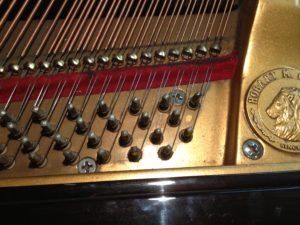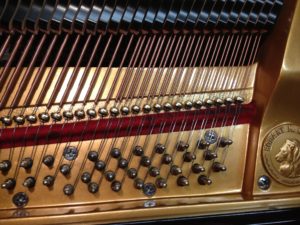Keep The Dust Out
Dust can be one of the biggest detriments to a piano. Not only does it cover everything and make it look bad, but it also gets into the moving parts and can cause all kinds of havoc. This and moisture is one of the major causes for keys, dampers, and hammers to operate slowly or stick. We recommend that if the piano isn't being played or you don't have visitors in your home, that you keep all covers and lids closed. This practice can substantially lengthen the time between major cleanings and other repairs. Keep it closed!
What To Clean With
What cleaning products you use on your piano depends on the finish it has.
If you have a wood piano with a traditional lacquer finish then the only product we recommend is Guardsman Furniture Polish. It contains no silicone or waxes and comes with a UV Protectant to help control fading. If you are using any cleaners that contain silicone, such as Pledge, then stop immediately.
If, however, your piano has a high polish polyurethane finish then you can simply use Windex to clean with and a high-grade car polish to clean up unsightly swirl marks or just to shine it in general. Whichever finish your piano has you should only use 100% cotton cloth. Do not use paper towels, blended materials, or micro-fiber cloths. Although no apparent damage will be seen immediately, over time these will slowly scratch the surface until one day you look at your piano and notice it no longer has a shine.
When cleaning the keys themselves, you should NEVER spray any cleaner directly on the keys. This will cause a great deal of moisture to accumulate inside the key area. You should always spray your rag directly to get it damp and then wipe the keys off. Most regular household cleaners will work just fine but avoid strong detergents as these will sometimes remove the finish from the ebony keys.
One last note - never put any liquid on the strings themselves! Only use a dry cloth to gently wipe them down.
Protect From U.V.
If over the course of the day your piano gets any direct sunlight you should take precautions. A steady stream of sunlight hitting a piano can fade the finish greatly over time. We recommend you either close the shade or curtains or have U.V. protection installed on the window glass itself. This can be very important! On lacquer pianos, if the finish gets faded you will have to have it refinished in order to restore the original color. If on the other hand, you have a polyurethane piano there is NO FIX! This is why it is imperative to keep your piano in the shade.
Keep Away From Vents
Temperature and humidity are the two things that change a piano's tune the most. Therefore, you should try to keep your piano away from any vents for heating and/or AC. If, due to constraints you must locate your piano on or near a vent you should take precautions. Either close the vent off completely or redirect the flow of air away from the piano. This will go a long way in making sure your piano stays in tune.


